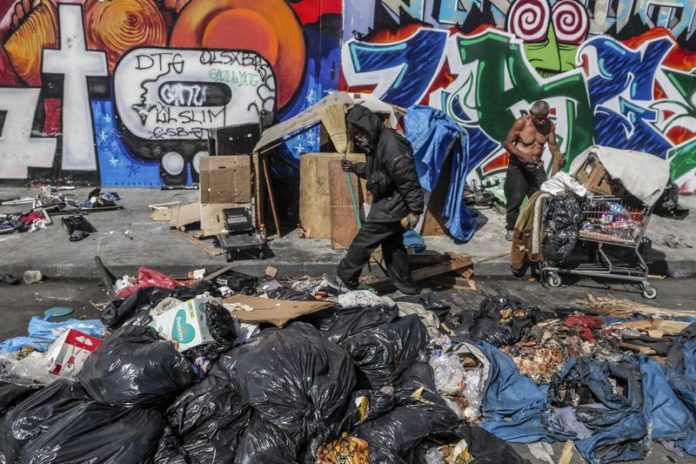There are a number of historic moments I’ve often wondered about, where I thought true lessons about human existence were exposed. Why, for example, did Rome fall? I’ve actually written about that, and a big part of the reason was that they devalued their currency in order to fund a massive welfare state. The Roman legions were paid in that currency, and many of the legions were Visigoths, and other non-Romans. These legions were paid in the Roman currency (the Denarius), and as the value of the currency they were paid in deteriorated to the point that they could not feed their families, the Visigoths marched on Rome.
In that previous article, I focused on the economic realities that caused Rome to fall, but in this article I want to focus on the moral failings of the Roman people that went hand-in-hand with those economic realities, and I want to show how the same moral failings underpin the United States of America today.
The United States was founded on the idea – radical at its time – that government exists to maximize the personal liberties of each individual. In such a system, responsibility starts with the individual. Justice was individual. Income was individual. Achievements were individual.
Many Americans, today, have rejected the American ideals of rugged individualism, replacing them with a new morality in which responsibility is collective. Justice is collective. Income is collective. Achievements are collective.
When responsibility starts with the individual, we are all responsible for our own actions, and none of us are responsible for the actions of other people. When responsibility is collective, on the other hand, we are all collectively responsible for the actions of whatever group(s) we are a part of. When justice is individual, the specifics of each individual case are all that matter. When justice is collective, on the other hand, the facts of individual cases take a second seat to the proportions of different groups that run afoul of the law.
There is some overlap between these moral systems. Someone who believes in individualism may also want to see increased economic opportunities in our inner cities, as one example. To such a person, each individual is still responsible for their own actions (and outcomes), but society can have a role in helping to provide opportunities for those living in disadvantaged areas (such as in many of our inner cities). Many individualists see school choice and charter schools as a way to improve educational opportunities for those who need more opportunity the most.
Similarly, some collectivists may want some differentiation between individual people, such that a doctor may have a higher income than a fast food worker.
At their core, however, individualists and collectivists are very different. The individualist believes that each individual must take primary responsibility for their own lives, whereas the collectivist sees each individual’s outcomes as being primarily predetermined by forces outside of their control. To the individualist, each person’s outcome reflects the results of their efforts, with differences in outcomes incentivizing desirable behaviors. To the collectivist, differences in outcomes prove systemic oppression.
To the collectivist, all income is collective, and property represents ill-gotten gains.
Crime too is considered collective to the collectivist. Crimes committed by members of supposedly oppressed groups are viewed as natural byproducts of said oppression. If a member of an oppressed group commits a crime against a member of a supposedly oppressive group, the crime can even be considered heroic – ANTIFA and Black Lives Matter burning down homes and businesses in predominantly white neighborhoods is one example.
Members of supposedly oppressed groups are guilty of all crimes committed by their group, with little or no regard for whether or not the individual had anything to do with those crimes (nor with any thought given to how often such crimes occur). Activities that are fine, and perhaps even heroic, when committed by some people, are criminal when committed by others, and certain groups are viewed as collective criminals upon whom all societal ills are blamed.
This is true in all collectivist societies. Hitler blamed Jewish people for the supposed oppression of the German people. Lenin blamed the Bourgeoise for the supposed oppression of the working classes. Mao blamed business people, government officials, students, professors, teachers, artists, and anyone else affiliated with pre-Maoist Chinese culture, with the oppression of everyone else. Hitler killed around 12 million people (including six million Jewish people). Lenin, and later Stalin, killed at least 20 million Russians, and at least 20 million more people in Soviet-controlled countries. Mao killed somewhere between 100 million and 200 million of his own people, and he and those who came after him have killed countless more in Tibet (which China took over), India (taking over Aksai Chin, and attempting to take over Arunachal Pradesh), Vietnam (The Crescent Group, the Paracels, and Johnson South Reef in the Spratlys), Cambodia (where they controlled the Khmer Rouge regime), Malaysia ( the Luconia Shoals), and the Philippians (Subi Reef, Mischief Reef, Scarborough Shoal, and Sandy Cay). China is actively engaged in several bouts of genocide even as I write this.
To an individualist, assigning collective guilt to a group is the antithesis of justice, but to the collectivist, justice requires the total subjugation of certain groups. Members of the targeted groups can only be forgiven for their collective guilt if they become radical adherents to the new order, and members of supposedly oppressed groups who do not follow the correct orthodoxy are treated even more harshly than are their supposed oppressors. Collectivists drown all dissent in a torrent of blood.
The truly scary thing about collectivism is the total moral certainty collectivists kill with. Hitler would rant and rave about his own moral purity, claiming to anyone who would listen that the millions upon millions he was killing proved his moral conviction. Stalin, Mao – all collectivists believe that what they are doing is necessary to bring in their collectivist order, and that any amount of bloodshed needed to create, and then to keep, their idealistic society is not only justified, but that killing for the cause is the highest act of moral purity possible.
Castro would send Che Guevara into towns and villages that were not ‘supportive enough’ of his revolution, and have him kill every single person living in that village or town. Che Guevara enjoyed killing so much that after the revolution ended, and he was put in charge of Cuba’s economy, he left Cuba to join revolutions elsewhere, such that he could continue to kill with impunity. Ironically, before discovering how much he enjoyed killing people, Che Guevara studied to be a doctor.
Individualists abhor murder, and collectivists claim to as well, but collective societies are built on stories of oppression, and it is only natural that a society that takes people who believe they are the oppressed victims of society, and then puts these people in charge of that society, they will seek revenge for the victimization they believe to have endured.
An individualist might look at the supposed oppression claimed by those in positions of power, and note that being in positions of power undercuts the claims of oppression. How can someone claim to be oppressed by a society that put them in positions of power and privilege? To the collectivist, however, questioning said oppression is not allowed – the questioning of oppression is a tool used by the oppressor to perpetuate said oppression. Logic, facts, reason – these are all tools of the Western Patriarchy, designed to hide us from the truth. Truth, we are told, can only be found by listening to the shared thoughts and experiences of those who believe themselves to be victims.
Victimhood is the political currency of the collectivist. The more a victim someone can claim to be – the more oppressed by society – the more political power they are given, and by giving people power based solely on how much of a reason they believe they have to hate society – how can anyone expect such a system to end well?
























